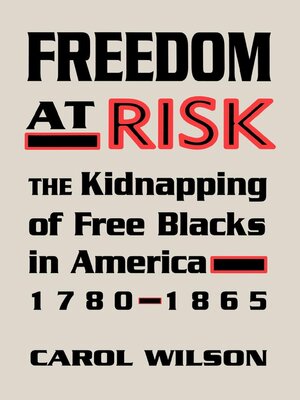
Sign up to save your library
With an OverDrive account, you can save your favorite libraries for at-a-glance information about availability. Find out more about OverDrive accounts.
Find this title in Libby, the library reading app by OverDrive.



Search for a digital library with this title
Title found at these libraries:
| Library Name | Distance |
|---|---|
| Loading... |
Kidnapping was perhaps the greatest fear of free blacks in pre-Civil War America. Though they may have descended from generations of free-born people or worked to purchase their freedom, free blacks were not able to enjoy the privileges and opportunities of white Americans. They lived with the constant threat of kidnapping and enslavement, against which they had little recourse.
Most kidnapped free blacks were forcibly abducted, but other methods, such as luring victims with job offers or falsely claiming free people as fugitive slaves, were used as well. Kidnapping of blacks was actually facilitated by numerous state laws, as well as the federal fugitive slave laws of 1793 and 1850. Greed motivated kidnappers, who were assured high profits on the sale of their victims. As the internal slave trade increased in the early nineteenth century, so did kidnapping.
If greed provided the motivation for the crime, racism helped it to continue unabated. Victims usually found it extremely difficult to regain their freedom through a legal system that reflected society's racist views, perpetuated a racial double standard, and considered all blacks slaves until proven otherwise. Fortunate was the victim who received assistance, sometimes from government officials, most often from abolitionists. Frequently, however, the black community was forced to protect its own and organized to do so, sometimes by working within the law, sometimes by meeting violence with violence.
Mining newspaper accounts, memoirs, slave narratives, court records, letters, abolitionist society minutes, and government documents, Carol Wilson has provided a needed addition to our picture of free black life in the United States.







